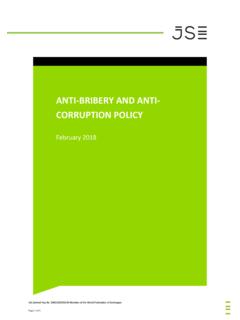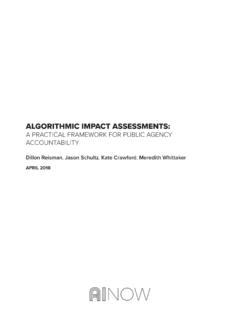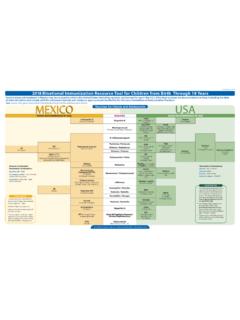Transcription of SETTLEMENT OBLIGATIONS T+3 - Johannesburg Stock …
1 SETTLEMENT OBLIGATIONS . T+3. april 2016 . JSE Limited Reg No: 2005/022939/06 Member of the World Federation of Exchanges JSE Limited I 2014. Page 1 of 34. 2. INDEX. Details Page Introduction .. 3. SETTLEMENT OBLIGATIONS for Controlled 4. 1 SETTLEMENT principles for transactions in equity securities .. 4. 2 Custody mandates for controlled client accounts .. 4. 3 General pre-trade SETTLEMENT requirements .. 5. 4 Controlled client SETTLEMENT OBLIGATIONS .. 6. 5 General SETTLEMENT 6. 6 Failed trade procedures .. 8. 7 Member SETTLEMENT OBLIGATIONS .. 9. 8 Borrowing of equity securities to prevent a trade from failing .. 10. 9 Lending of funds to prevent a trade from 10. 10 Closing out a trade and compensation.
2 11. 11 Give-up procedures .. 11. 12 Failed 12. SETTLEMENT OBLIGATIONS for Non-Controlled Clients .. 12. 1 SETTLEMENT principles for transactions in equity securities .. 12. 2 Appointment of a CSDP .. 12. 3 General pre-trade SETTLEMENT requirements .. 13. 4 General SETTLEMENT 13. 5 CSDP 14. 6 Non-commit by CSDP .. 14. 7 Failed trade principles and procedures .. 16. 8 Member SETTLEMENT OBLIGATIONS .. 17. 9 Borrowing of equity securities to prevent a trade from failing .. 17. 10 Lending of funds to prevent a trade from 18. 11 Closing out a trade and compensation .. 18. 12 Give-up procedures .. 19. 13 Failed 19. Applicable Definitions .. 21. SETTLEMENT OBLIGATIONS of Clients april 2016 .
3 3. INTRODUCTION. This document sets out the SETTLEMENT OBLIGATIONS of clients who enter into transactions in JSE listed equity securities that settle electronically through Strate. The requirement for JSE. equity members to make their clients aware of their SETTLEMENT OBLIGATIONS is laid out in rule of the JSE. The JSE deems it necessary for members to make their clients aware of their SETTLEMENT OBLIGATIONS in the interests of all participants especially with the current move to a T+3. SETTLEMENT cycle. This document has two broad sections, being the SETTLEMENT OBLIGATIONS of controlled clients, and the SETTLEMENT OBLIGATIONS of non-controlled clients. Either one of the two sections will be applicable to a client at any point of time.
4 In order to assist in distinguishing the two types: a controlled client is a client, or an account holder on whose behalf a client is acting, who does not appoint a CSDP of their own, since their funds and equity securities are under the control of a custody services provider and are reflected on the BDA. system and are settled via the CSDP of a member. As a result, the SETTLEMENT of their transactions is conducted by the member of the client via accounts belonging to the member in the records of the CSDP of that member;. a non-controlled client is a client, or an account holder on whose behalf a client is acting, who has appointed its own CSDP. As a result, the SETTLEMENT of their transactions is conducted by the CSDP of the client via the accounts belonging to the client in the records of the CSDP.
5 For ease of reference, the relevant rules that create the SETTLEMENT OBLIGATIONS and penalties for the transgression of these rules are reflected in boxes in the text. Relevant definitions are set out in the last section of the document. Readers' queries with regard to the content of this document should be addressed to Brett Kotze at the JSE e-mailed This document is also available on the JSE website, and can be downloaded from the addresses and SETTLEMENT OBLIGATIONS of Clients april 2016 . 4. SETTLEMENT OBLIGATIONS FOR CONTROLLED CLIENTS. SETTLEMENT Obligation 1. SETTLEMENT will take place in accordance with the following principles: Each transaction represented by a single contract note between the ultimate buyer and ultimate seller.
6 Applying the market convention that parties to a transaction have a contractual obligation to cause such transaction to settle on a specific day, SETTLEMENT day (which is three business days after the trade was done); and On a net basis per member, per equity security per trade type. APPLICABLE RULES. Rule SETTLEMENT principles for transactions in equity securities All transactions in equity securities must be settled electronically through STRATE in accordance with the following principles . contract note by contract note;. between the ultimate buyer and the ultimate seller;. on a rolling and contractual basis, whereby transactions become contractually due to be settled a prescribed number of days after the trade date; and on a net basis per member and per equity security, whereby individual contract notes are consolidated and offset into net amounts of securities and funds for SETTLEMENT .
7 SETTLEMENT Obligation 2. A controlled client must sign a mandate in favour of a member before any cash or securities are received by the member. A controlled client must obtain a receipt from the member when securities in certificated form are placed under the control of the member. A controlled client must receive a statement on at least a quarterly basis or more frequently if the client so requests and reconcile the equity securities and funds reflected on the statement with his records. Any discrepancies should immediately be raised with their member for investigations. A controlled client must advise a member of its choice for an elective corporate action as set out in the client mandate or agreed with their member A controlled client must advise a member if it wishes to receive information from any issuer regarding securities that the client owns and if their email address may be supplied to the Issuer to allow for electronic communication from the Issuer.
8 SETTLEMENT OBLIGATIONS of Clients april 2016 . 5. APPLICABLE RULES. Rule Safeguarding of assets in controlled client accounts The arrangements made by a controlled client with a member in respect of custody of equity securities and funds must be recorded in a written mandate. The mandate must contain the minimum requirements as prescribed by the JSE. The controlled client must accept the terms of the mandate and communicate such acceptance to the member before any funds or equity securities are accepted from the controlled client. The mandate may be in electronic form and its acceptance may be expressed by electronic means, provided that if acceptance occurs otherwise than by electronic means, the expression of acceptance must be evidenced by the physical signature of the controlled client Where certificated equity securities are received from a controlled client, a dated and signed receipt recording the name, quantity, certificate number and registered holder of the equity security must be issued forthwith Rule Client statements Statements shall be provided to clients.
9 At regular intervals which may not exceed three months, unless the client consents in writing not to receive the statements because they are able to access the information made available by the member through electronic means, such as the internet, on a continuous basis; or monthly if the client's portfolio as managed by the member includes any open positions in derivative instruments; or at such intervals of less than three months as the client requests, although the member shall not be obliged to provide statements more frequently than monthly. Rule Management of Corporate Actions The arrangement between a member and a controlled client regarding issues pertaining to corporate actions must be recorded in writing.
10 The written arrangement must, as a minimum, incorporate the instructions from the controlled client and the terms and conditions which will apply to the following issues pertaining to corporate actions - whether the client wishes to receive all company reports, proxy forms, notices, circulars, listing particulars and any other issuer communications, in respect of equity securities of which such client is a beneficial owner;. whether the member is entitled and obliged to utilise its discretion in electing particular options in respect of all or certain corporate action events which require such an election to be made;. whether the member may utilise its discretion in exercising voting rights on behalf of the client.













